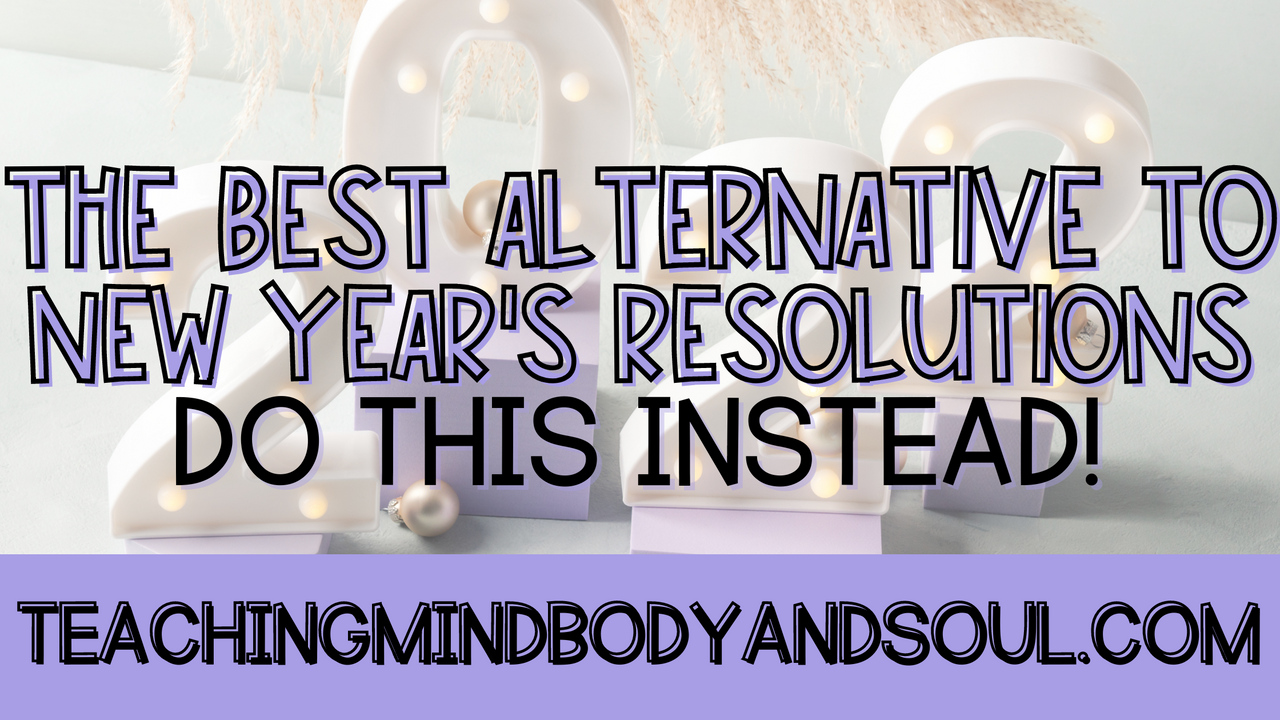The Best Alternative to New Year's Resolutions: Stop Making Resolutions and Do This Instead!
Jan 01, 2022
It is that time of the year again. People are buying gym memberships, work out clothes, and stocking up for their New Year's Resolutions. The good intentions are there for changing and making the best versions of ourselves this new year...but...let's be real. In any given study, less than 7% of people who make resolutions actually keep them past February. Stop making new year's resolutions. So, what should you do instead? Let me share the BEST Alternative to New Year's Resolutions.
Top 5 Reasons New Year's Resolutions Don't Work
1. Your resolutions are about cutting out suffering instead of increasing your overall fulfillment. They are rooted in stress and become one more thing to do. Keep reading to find out the science behind how your brain reacts to making resolutions.
2. You don't have enough great reasons to accomplish your resolutions. You are not clear about your "why."
3. You don't believe you can; you doubt yourself. Therefore, you do not commit to them.
4. You are trying to change your entire life overnight and it's too overwhelming. You know the end result, but become overwhelmed with why, when, how, where. Not recognizing that the present moment and where you are right now is part of the journey up the mountain.
5. You're not being honest with yourself. Is your resolution really something you WANT to do or is it just something you think you SHOULD do. If you don't really like running, why make yourself do something you don't enjoy? If you want to become more active, why is running the only way you can accomplish this?

Why New Year's Resolutions Don't Work: The Science
Have you ever created a resolution? When creating resolutions, people tend to bite off more than they can chew. People try to do it all on their own, even when they have multiple resolutions. People get too frustrated and quit. Resolutions create this sense of obligation, and if you've ever been around a teenager who had an obligation, you know there's some backlash. That is actually a brain function. Feeling obligated to do something sets us up for failure by creating stress and activating the sympathetic nervous system, the body’s natural fight-or-flight response. Even though it's not an actual threat, the stress of meeting an obligation (or attempting to meet the qualifications of a New Year's resolution) is basically set up for failure. Our human biology is literally the source of us not meeting our well-intentioned list of to-do's and avoiding it like the plague.
You might be thinking, well I do goal planning sessions instead. I don't make New Year's Resolutions. In the book Helping People Change, Richard Boyatzis says, “Goals ask people to declare something to which they aspire and are supposed to achieve. For many people…this creates obligation. The obligation creates and begins to add to [a] negative process in the brain… The goal then may become something to avoid rather than pursue…When we set a goal, we begin to think of how to work toward it. This invokes the analytical brain…parts of this network invoke our stress response and often impair us cognitively, emotionally, and physically. By focusing on the goal, we tend to see what is directly in front of us and lose sight of other possibilities on the horizon.”
Instead we need to start with a vision...
New Year’s resolutions focus on taking something away (i.e. carbs, sugar, weight); whereas, creating a vision and ultimately a vision board focuses on adding something positive into your life, versus taking things away. The personal vision is not a goal or a strategy. As Boyatzis states “Put simply, a personal vision is an expression of an individual’s ideal self and ideal future. It encompasses dreams, values, passions, purpose, sense of calling, and core identity. It represents not just what a person desires to do, but also who she wishes to be.” Vision is a clear image how you see your future. Vision is aligned with your deepest values and priorities, while goals are set as a specific target that move you towards your vision.
Creating a personal vision and ultimately a vision board is an evidence-based way to accelerate growth and inspire positivity. Working from the starting point of the personal vision takes the real and self-created limiting beliefs out of the equation. It allows us to imagine our ideal selves and the ideal life several years down the road and this is scientifically proven to be more inspiring than removing gluten from our diet or drinking x amount of ounces of water daily.
Now I'm far from saying that setting goals is a bad idea, but we must recognize that setting short term and long term goals are part of the bigger process. To getting closer to our personal vision, they are the stepping stones that are important for reaching greater fulfillment. Vision is a huge factor of changing your limiting beliefs and seeing the bigger picture so that you can make meaningful and more authentic goals.
Enjoy more about vision planning, vision boards, and self-care:
- The Ultimate Guide to Digital Vision Boards - Grab Your Free Digital Vision Board Template (Customizeable here)
- Stay organized towards your goals and vision & start Digital Planning Today with your free Daily Digital Planner and Journal
- The Simple Formula for Creating Your Personal Vision Statement in less than 30 minutes
- The Individualized EduCare Program - The Ultimate Way to Create Your Unique and Authentic Self-Care Plan
Stay connected with news and updates!
Join our mailing list to receive the latest news and updates from our team.
Don't worry, your information will not be shared.
We hate SPAM. We will never sell your information, for any reason.





